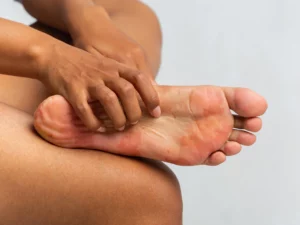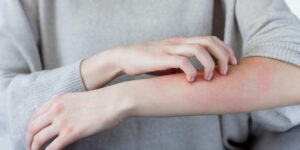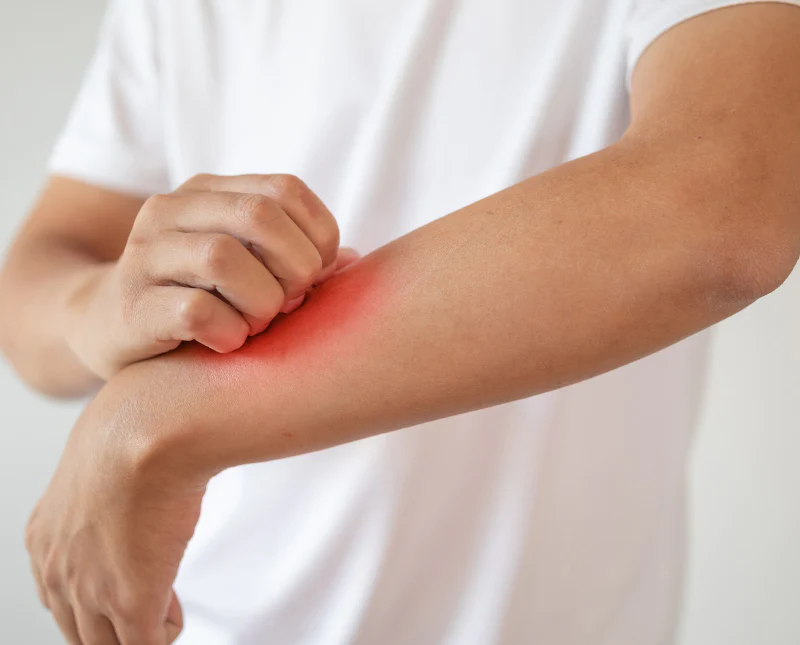Diabetes, a chronic condition affecting millions worldwide, comes with a host of potential complications, one of which is skin itching. Often overlooked, this symptom can significantly impact the quality of life. In this blog, we explore the underlying causes of diabetic itching and provide practical advice and some diabetic itching cures to help manage this uncomfortable condition.
Contents
Why Do Diabetics Feet Itch So Much?
 Diabetic itching, particularly in the feet, can be attributed to several factors related to diabetes. Here are some of the main reasons:
Diabetic itching, particularly in the feet, can be attributed to several factors related to diabetes. Here are some of the main reasons:
- High Blood Sugar Levels: Chronic high blood sugar, a hallmark of diabetes, can lead to poor circulation and nerve damage (neuropathy). When the nerves in the feet are affected, it can result in sensations such as tingling, burning, and itching.
- Dry Skin: Diabetes often causes dry skin due to impaired sweat and oil production. This can result from nerve damage. Dry skin is prone to itching, cracking, and infections.
- Yeast Infections: Individuals with diabetes are more susceptible to yeast infections due to high levels of glucose in the skin. Yeast infections can cause itching. Especially in areas like the feet where moisture can accumulate.
- Poor Circulation: Reduced blood flow, often experienced by those with diabetes, can lead to skin irritation and itching. Poor circulation can slow wound healing. And, making the skin more susceptible to infections and irritation.
- Kidney Disease: Diabetes can lead to kidney problems. It may cause itching. When the kidneys are not functioning properly, waste products can build up in the blood, leading to itchy skin.
- Allergic Reactions: Diabetics might be more susceptible to allergic reactions to medications, skincare products, or materials (like certain socks or shoes), which can lead to itching.
- Skin Conditions: Conditions like eczema or psoriasis might be more common in individuals with diabetes. These conditions can cause itching and are often more severe in those with diabetes.
- Neuropathic Itching: In some cases, the nerve damage caused by diabetes can lead to a specific type of itching known as neuropathic itching, where the itch feels deeper like it’s under the skin.
Regular check-ups with a healthcare professional are essential for effective management of diabetes and its associated symptoms.
What Are The Best Diabetic Itching Cures?
Managing and treating diabetic itching involves a combination of good diabetes management, skin care, and sometimes medication. Here are some of the best diabetic itching cures:
Control Blood Sugar Levels
Effective management of blood sugar levels is crucial in reducing the risk of complications associated with diabetes, including skin problems like itching. High blood sugar can damage blood vessels and nerves, leading to poor circulation and diabetic neuropathy, which can cause itching. Strict adherence to prescribed medication, along with a balanced diet and regular exercise, helps in maintaining blood sugar levels within a healthy range.
Moisturize Regularly
Dry skin is more prone to itching. Using a moisturizer that’s free from fragrances and other irritants can help maintain the skin’s natural moisture balance. It’s most effective when applied after bathing. As it helps in trapping moisture on the skin. Look for products specifically formulated for sensitive or diabetic skin.
Stay Hydrated
Internal hydration is as important as external moisturization. Drinking plenty of water throughout the day helps maintain the skin’s elasticity and reduces dryness, thereby decreasing the likelihood of itching.
Gentle Skin Care
The choice of skincare products can significantly impact skin health. Using mild, non-irritating soaps and laundry detergents is recommended to avoid any skin irritation. Moreover, excessively hot water in baths or showers can strip the skin of its natural oils, leading to dryness. So it’s better to use warm water.
Treat Skin Conditions
Conditions such as eczema or psoriasis can exacerbate itching. It’s important to follow through with any prescribed treatments for these conditions. This might include the use of topical creams, ointments, or other medications.
Avoid Scratching
Scratching provides temporary relief but can lead to skin damage and infections, especially if sensation is reduced due to neuropathy. Keeping nails trimmed and wearing gloves at night can help prevent scratching.
Manage Neuropathy
If neuropathy is a contributing factor to itching, managing it can provide relief. Medications like pregabalin or gabapentin, prescribed for neuropathic pain, may also help alleviate itching by reducing nerve irritation.
Phototherapy
In cases where conventional treatments are not effective, phototherapy can be a useful option. This treatment involves exposing the skin to specific wavelengths of light under medical supervision, helping to reduce itching and inflammation.
Balanced Diet
A diet rich in nutrients can improve skin health. Omega-3 fatty acids found in fish and nuts, and antioxidants found in fruits and vegetables, can promote healthy skin and reduce inflammation.
Regular Check-ups
Regular visits with a healthcare provider are essential for monitoring and managing diabetes and its complications. This includes discussing any skin-related issues like itching to ensure appropriate treatment and management strategies are in place.
Each of these points plays a vital role in the overall management of diabetic itching. It’s a multifaceted approach that involves good diabetes control, proper skin care, and, when necessary, specific treatments. It’s always advisable to consult with healthcare professionals to tailor these strategies to individual health needs and conditions.
What Is The Best Cream For Diabetics Itching?
 The best cream for diabetic itching often depends on the specific cause and severity of the itching. However, there are several types of creams and ingredients commonly recommended for managing skin itchiness in diabetics:
The best cream for diabetic itching often depends on the specific cause and severity of the itching. However, there are several types of creams and ingredients commonly recommended for managing skin itchiness in diabetics:
- Moisturizing Creams
Since dry skin is a common cause of itching in diabetics, a good quality moisturizing cream is essential. Look for products that are specifically formulated for sensitive or diabetic skin. Ingredients like glycerin, lanolin, and petroleum jelly are effective for locking in moisture. Avoid creams with fragrances or dyes that can irritate the skin.
- Hydrocortisone Cream
For mild itching, an over-the-counter 1% hydrocortisone cream can be helpful. It works by reducing inflammation and can provide temporary relief from itching. However, it should be used sparingly and not for prolonged periods, as it can thin the skin over time.
- Antifungal Creams
If the itching is due to a fungal infection, such as athlete’s foot, an antifungal cream will be necessary. Common ingredients in these creams include clotrimazole or miconazole.
- Antibacterial Creams
In cases where itching is caused by a bacterial infection, an antibacterial cream may be required. Neomycin or bacitracin are typical ingredients in over-the-counter antibacterial ointments.
- Creams Containing Ceramides
Ceramides are lipids that help form the skin’s barrier and retain moisture. Creams containing ceramides can be beneficial for diabetics with dry, itchy skin.
- Topical Anesthetics
Creams with pramoxine hydrochloride can numb the skin, providing relief from itching. These should be used with caution and under the guidance of a healthcare professional.
- Colloidal Oatmeal Creams
These creams can soothe and reduce itching due to their anti-inflammatory properties.
When choosing a cream for diabetic itching, it’s important to consider your specific symptoms and skin type. It’s also advisable to consult with a healthcare provider, especially if the itching is severe, persistent, or accompanied by other symptoms like redness, swelling, or pain.
Should I Consider Medication For Diabetic Itching?
 Whether you should consider medication for diabetic itching depends on several factors, including the severity and cause of the itching, the effectiveness of non-medication measures you’ve tried, and your overall health status. Here are some guidelines to help you decide:
Whether you should consider medication for diabetic itching depends on several factors, including the severity and cause of the itching, the effectiveness of non-medication measures you’ve tried, and your overall health status. Here are some guidelines to help you decide:
- Severity and Impact: If the itching is severe, persistent, and affecting your quality of life, such as disrupting your sleep or daily activities, medication might be necessary.
- Non-Medication Approaches: Before considering medication, it’s important to try non-pharmacological approaches. This includes maintaining good blood sugar control, using moisturizers, avoiding irritants, and ensuring proper hydration. If these measures are ineffective, medication may be the next step.
- Underlying Causes: It’s crucial to determine if the itching is a direct result of diabetes (like poor circulation or neuropathy) or if it’s caused by a secondary condition such as a skin infection or dermatitis. Medications will differ based on the underlying cause.
- Consultation with Healthcare Provider: It’s important to consult with a healthcare provider before starting any medication. They can evaluate the cause of your itching and recommend appropriate treatment. It may include topical creams, oral medications, or other therapies.
- Consider Your Overall Health: Your overall health, including any other medical conditions you have and medications you are taking, will influence whether you should use certain medications for itching.
Remember, self-medication, especially in the context of a chronic condition like diabetes, is not advisable. There can be interactions between medications and potential side effects that need to be considered.
Conclusion
In conclusion, diabetic itching cures involve a combination of strategies including maintaining good blood sugar control, employing regular skin care routines with moisturizers and gentle products, and staying hydrated. It’s important to address any underlying conditions that might be contributing to the itching, such as skin infections or neuropathy.
While non-medication approaches are the first line of defense, medication may become necessary if these methods are not sufficient. Always consult with a healthcare professional to determine the best course of action for your specific situation. Do you want to get rid of diabetes? Join our online diabetes treatment program and reverse Diabetes naturally through lifestyle changes such as a Personalized Diet plan, Exercise, Yoga, dieticians, and health coaches.

